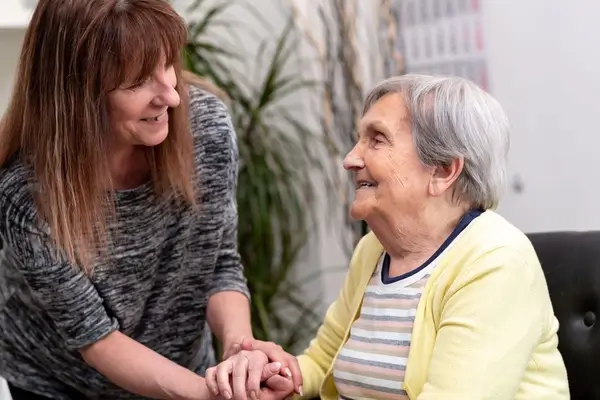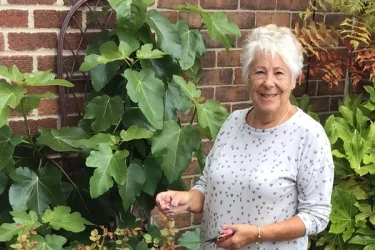Ensuring ageing family members have access to the right healthcare can be a source of stress for many. It’s not uncommon for older adults to be reluctant to act on health concerns or speak to medical professionals. So, what do you do when an elderly parent refuses medical treatment, even when it’s clear they need it?
In this guide, we’ll explore common scenarios and provide practical tips on how to handle these situations.

Understanding the challenge
When faced with a situation where your elderly parent is resistant to visiting the doctor, it can be challenging. Addressing the root cause of their reluctance can be helpful. Is it fear, distrust, not wanting to cause a fuss, or simply a belief that they don’t actually need medical attention? Once you have a better understanding of their point of view, it will be easier to offer reassurance.
If your elderly parent refuses to go to hospital, this can pose a more significant challenge. Especially if the situation requires urgent attention. Understanding their concerns and discussing the potential benefits of hospital care is key.
How to deal with an elderly parent who refuses medical help
Below are some practical tips on how to convince your parents that seeing a healthcare professional is a good idea.
Practise open and honest communication
Open and empathetic communication is important when talking to an ageing parent refusing care. Listen to their fears and concerns without judgement while expressing your own worries about their health. Discussing the potential consequences of refusing treatment may help them see the importance.
Highlight the benefits
Focusing on the positives of getting treatment can help to reframe something that is potentially scary in a new light. For example, talking to them about the changes that a knee replacement could make to their quality of life could inspire them to seek help. Less pain, better mobility, and the freedom to get back to some of their favourite activities may just sway their decision!
Patient testimonial
“I have just enjoyed a lovely holiday in Tunisia – the first time in five years I have gone away…I just cannot begin to say how grateful I am to be able to do all the things I love. I am now 21 weeks after my operation. It truly has been amazing.”
Karen, knee surgery patient at Practice Plus Group, Barlborough
Involve a trusted healthcare professional
Sometimes, the advice of a trusted healthcare professional can carry a lot of weight. Schedule an appointment with their GP or medical specialist who can provide more insights and recommendations about their medical care.
Seek a second opinion
If your parent is hesitant about a specific treatment plan, consider seeking a second opinion. Another medical professional may offer alternative options or provide additional information that addresses their concerns.
Explore in-home care
Sometimes, your only option is to accept the situation and seek an alternative. If the fear of hospitals or doctors is a significant factor, explore in-home care options. Many medical services provide home care services, ensuring they receive the right attention in a more comfortable and relaxed environment.
Attend appointments with them
If your ageing parent refuses to visit the doctor and feels anxious about it, it may help if you offer to go with them. Taking them to the appointment yourself could provide a source of reassurance.
Opt for an appointment over the phone
Many GPs and health providers offer appointments or consultations by phone or virtually. This could take away some of the apprehension about visiting a medical environment, especially if your parent has mobility issues.
For example, our patient services team offers a friendly phone service giving you all the information you may need about possible treatment options. Give us a call yourself, or pass our number on to your parent.
Choose a local provider
If your parent has mobility problems, travelling far for treatment can add to their reluctance. With 10 hospitals and surgical centres across the UK, Practice Plus Group can make life easier for you.
Talk to your elderly parent’s doctor
Your parent’s GP or healthcare provider will have dealt with similar situations before. Try giving them a call to discuss your concerns and get a better idea of what treatment is needed.
In some cases, if your parent has mental health issues or conditions such as dementia, he or she may be unable to make important decisions. In this instance, you may need to look into getting power of attorney to access their medical information and help make these difficult decisions on their behalf.
Questions to ask the doctor about your elderly parent
When caring for an elderly parent, effective communication with their healthcare provider is crucial. Asking the right questions can help you better understand your parent’s health, treatment options, and overall care plan. Here is a list of questions to consider asking the doctor:
- what is the diagnosis? Can you explain it in simple terms?
- are there any other medical issues that may be affecting my parent’s health?
- what are the available treatment options?
- are there alternative therapies or lifestyle changes that could be beneficial?
- what are the potential benefits and risks of each treatment option?
- what medications are prescribed, and what are they for?
- are there potential side effects with other medications?
- how should the medications be taken, and are there any specific instructions or precautions?
- what signs or symptoms should we look out for?
- how often should my parent have follow-up appointments?
- are there specific tests or monitoring that should be done regularly?
- what signs should prompt us to seek immediate medical attention?
- are there specific day-to-day activities my parent should do or not do?
- do you recommend any home modifications or additional support services?
- are there resources or support groups for both my parent and myself as a caregiver?
- are there specialists or other healthcare professionals we should coordinate with?
- should we consider live-in care, assisted living, or hospice options?
Dealing with an elderly parent refusing medical treatment can be emotionally taxing and exhausting. However, it’s important to approach the situation with empathy and understanding. By trying these tips and addressing the root causes of their resistance, you can work towards ensuring your parent receives the medical attention they need.
Find a healthcare provider you can trust
From hip replacement surgery to cataract treatments, we provide hundreds of private medical treatments every month. We’re particularly experienced in working with older patients, helping them get back to feeling more like themselves.
Your mother or father could benefit from:
- shorter wait for treatment
- more affordable prices
- access to first-class specialists across the UK at a location that suits them.
Elderly parent care FAQs
If you haven’t found the answer to your concerns, check out our frequently asked questions about medical care for elderly relatives.
Adults generally have the legal right to make their own decisions about medical treatment. However, there are certain situations where medical treatment may be provided against a person’s wishes. This is typically in exceptional circumstances and subject to legal and ethical considerations. For example, if a dementia patient is deemed to lack mental capacity or in an emergency situation.
If you are facing a situation where you believe your parent needs medical treatment but is refusing it, consult with healthcare professionals, social workers, or legal professionals who can provide guidance.
Ensuring a loved one’s health while respecting their autonomy can be a balancing act. The key is to maintain open communication, involve healthcare professionals when necessary, and follow the tips set out above.
In addition to the tips shared above, you could try:
- sharing your concerns about their health, mentioning specific symptoms to help persuade
- providing more information about the possible treatment options
- sharing success stories where others have had positive outcomes for similar treatments
- asking other family members for help.






